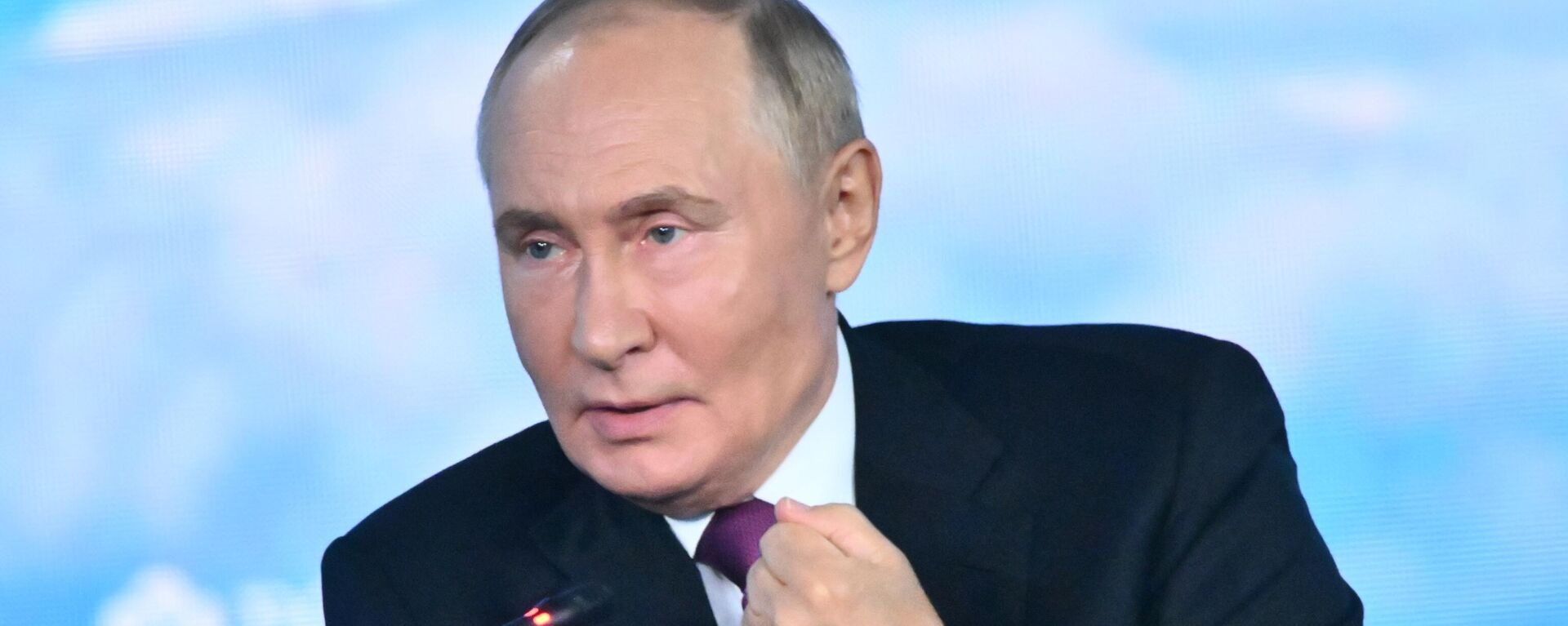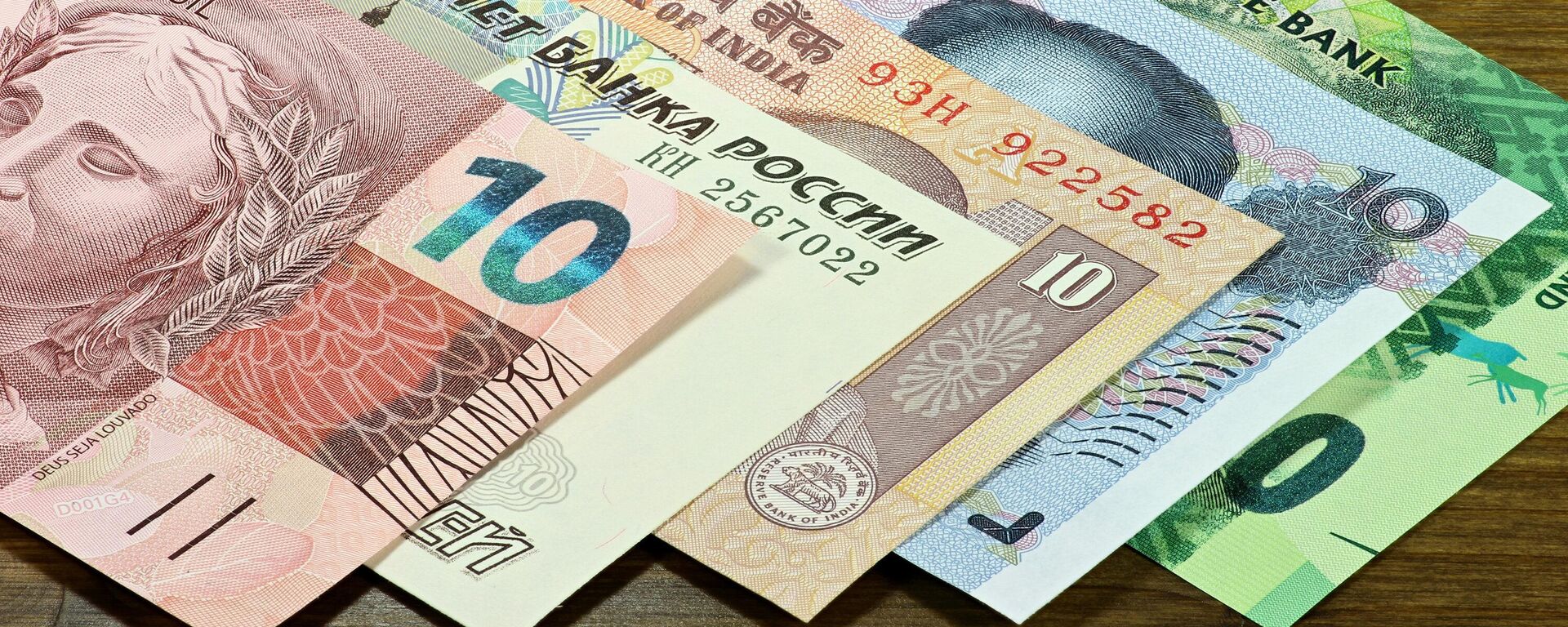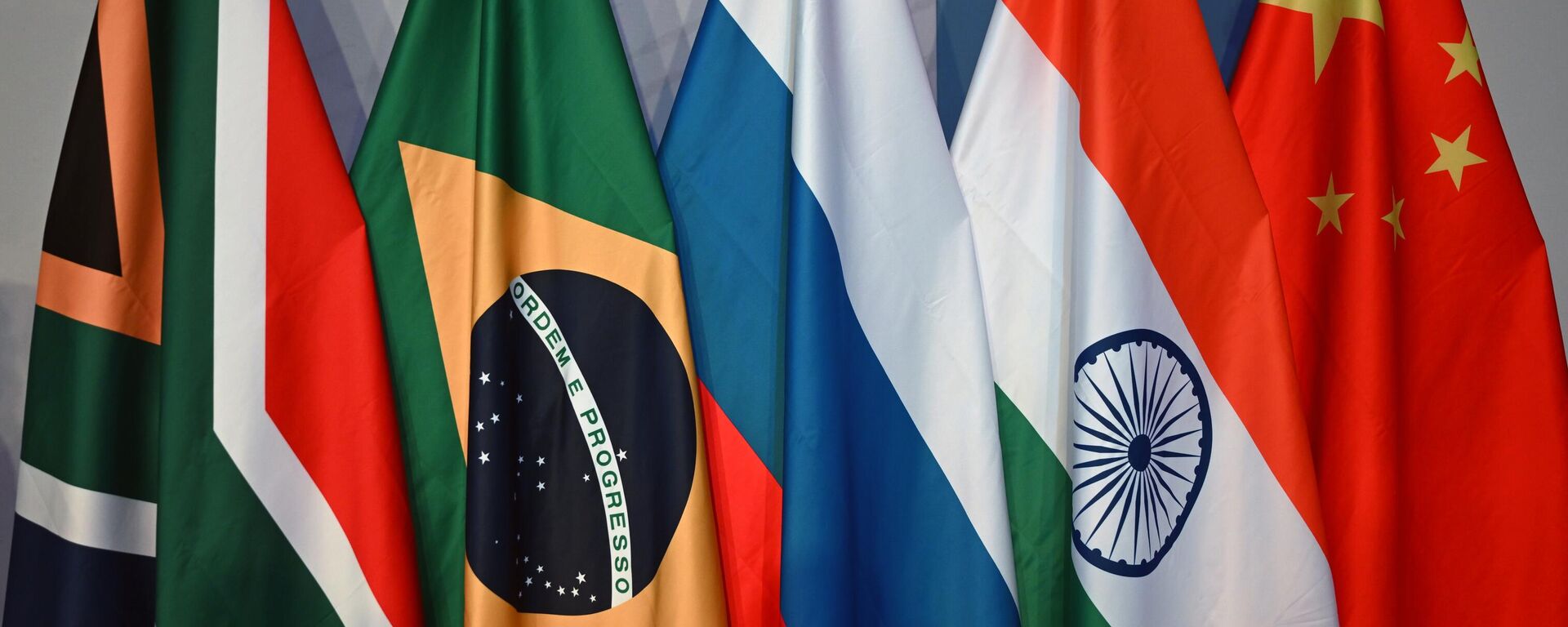https://sputnikglobe.com/20240916/experts-on-future-of-brics-currency-us-dollar-and-sanctions-1120165297.html
Experts On Future of BRICS Currency, US Dollar and Sanctions
Experts On Future of BRICS Currency, US Dollar and Sanctions
Sputnik International
The videoconference, Global Majority in the 21st Century: Countering Sanctions and Searching for an Alternative to the Dollar, focused on major issues, with leading experts on international financial relations speaking about the prospects for using national currencies for intra-BRICS transactions, the future of the dollar, the BRICS currency plans, as well as the impact of sanctions on the Russian economy.
2024-09-16T09:14+0000
2024-09-16T09:14+0000
2024-09-16T09:14+0000
analysis
russia
brazil
brics
india
south africa
china
https://cdn1.img.sputnikglobe.com/img/07e8/09/10/1120165495_0:160:3074:1889_1920x0_80_0_0_3c4da5cd4f82e3d7a3f8bddc7ad6e833.jpg
The videoconference, Global Majority in the 21st Century: Countering Sanctions and Searching for an Alternative to the Dollar, focused on major issues, with leading experts on international financial relations speaking about the prospects for using national currencies for intra-BRICS transactions, the future of the dollar, the BRICS currency plans, as well as the impact of sanctions on the Russian economy.The speakers included Marcos Caramuru, former Executive Director of the World Bank, member of the International Board of the Brazilian Center for International Relations (CEBRI); Sergey Afontsev, Corresponding Member of the Russian Academy of Sciences, Deputy Director of IMEMO of the Russian Academy of Sciences, Head of the Global Economy Department at the Faculty of Economics, Lomonosov Moscow State University; Ekaterina Arapova, Director of the Center for Sanctions Policy Expertise at the Institute for International Studies; Abdul Aziz Shabani, Research Fellow at Al Riyadh Center for Political and Strategic Studies; Mostafa Ahmed, specialist in regional security at the Al Habtoor Research Center; and Xu Wenhong, Deputy Secretary General of the Belt and Road Center, Chinese Academy of Social Sciences.Commenting on the prospects for BRICS new currency, former Executive Director of the World Bank and member of the International Board of the Brazilian Center for International Relations (CEBRI) Marcos Caramuro noted that in order to stimulate the use of national currencies in trade, interested nations should consider a reserve asset similar to the SDR (the acronym stands for Special Drawing Rights). “The idea of transforming this potential asset into a BRICS currency is more complicated,” the expert stressed. “This will certainly require additional research, but it is not impossible to discuss, at least in an experimental vein, the concept of an agreement creating assets similar to SPDs, which will be used as a benchmark in trade between the BRICS countries.”Sergey Afontsev, Deputy Director of IMEMO of the Russian Academy of Sciences, underscored the Russian economy’s stability: “Despite the significant toll the sanctions are taking, as well as the lost profits, the Russian economy is functioning very well under sanctions. Last year, for the first time in many years, economic growth in Russia exceeded the growth rate of the global economy. This trend will continue this year. This is not just the opposite of the intended effect the initiators of the sanctions had in mind; this has actually turned the logic of their actions 180 degrees.” The expert also noted that the choice of foreign partners for economic cooperation is the sovereign right of every sovereign state.Ekaterina Arapova, Director of the Center for Sanctions Policy Expertise at the Institute for International Studies, pointed out that the current geopolitical situation is actually conducive to the formation of a resource for national economic growth and stability in Russia under the external sanctions pressure. According to the expert, the integration of national payment systems among the BRICS member states is one of the tools for adapting to sanctions risks and, despite certain constraints, it is also an important factor in stabilizing the situation. Arapova emphasized the importance of opening branches of Russian banks in friendly jurisdictions, citing VTB Bank’s experience in Shanghai.Abdul Aziz Shabani from the Al Riyadh Center for Political and Strategic Studies said that “BRICS is challenging the traditional dominance of Western institutions,” creating a platform for expressing its interests loud and clear. The expert highlighted some of the group’s major achievements, such as the creation of the BRICS Development Bank, which represents an alternative to traditional Western institutions and makes it possible to implement projects in emerging markets. Saudi Arabia’s accession to BRICS, the expert maintained, indicates geopolitical changes in the energy market and suggests that developing economies are beginning to play an increasingly prominent role in the world.Mostafa Ahmed, specialist in regional security at the Al Habtoor Research Center, noted that countries around the world should strive for greater flexibility of trade ties to overcome excessive dependence on the dollar: “Until now, the US dollar has been the dominant currency in international transactions, but today, we are making small steps to ensure that governments, including in the Middle East, agree to work out bilateral mechanisms that would give us alternative solutions in international trade. And it is quite possible that in the future, such bilateral agreements will pave the way for creating a new common currency, possibly in the BRICS format.”Xu Wenhong, Deputy Secretary General of the Belt and Road Center of the Chinese Academy of Social Sciences, speaking about the current state of the international financial system, stressed that the modern financial infrastructure, in particular, the SWIFT payment system, has long lost the potential to meet the interests of most countries, becoming a political and economic pressure tool instead: “Over the past decades, Western countries, led by the United States, have been promoting their payment system, one that suits exclusively their interests. Political factors are increasingly playing a role in international trade today, and international financial institutions are being weaponized in political squabbles.”
https://sputnikglobe.com/20240905/use-of-national-currencies-in-russia-brics-settlements-reaches-60---putin-1120033256.html
https://sputnikglobe.com/20230831/pepe-escobar-does-brics-need-its-own-currency-1113013286.html
https://sputnikglobe.com/20240907/why-turkiyes-move-to-join-brics-as-full-member-is-big-deal-1120069962.html
russia
brazil
south africa
china
Sputnik International
feedback@sputniknews.com
+74956456601
MIA „Rossiya Segodnya“
2024
Sputnik International
feedback@sputniknews.com
+74956456601
MIA „Rossiya Segodnya“
News
en_EN
Sputnik International
feedback@sputniknews.com
+74956456601
MIA „Rossiya Segodnya“
Sputnik International
feedback@sputniknews.com
+74956456601
MIA „Rossiya Segodnya“
the videoconference, global majority in the 21st century: countering sanctions and searching for an alternative to the dollar, focused on major issues, with leading experts on international financial relations speaking about the prospects for using national currencies for intra-brics transactions, the future of the dollar, the brics currency plans, as well as the impact of sanctions on the russian economy.
the videoconference, global majority in the 21st century: countering sanctions and searching for an alternative to the dollar, focused on major issues, with leading experts on international financial relations speaking about the prospects for using national currencies for intra-brics transactions, the future of the dollar, the brics currency plans, as well as the impact of sanctions on the russian economy.
Experts On Future of BRICS Currency, US Dollar and Sanctions
Sputnik has hosted an international discussion on the current economic agenda.
The videoconference, Global Majority in the 21st Century: Countering Sanctions and Searching for an Alternative to the Dollar, focused on major issues, with leading experts on international financial relations speaking about the prospects for using national currencies for intra-BRICS transactions, the future of the dollar, the BRICS currency plans, as well as the impact of sanctions on the Russian economy.
The speakers included Marcos Caramuru, former Executive Director of the World Bank, member of the International Board of the Brazilian Center for International Relations (CEBRI); Sergey Afontsev, Corresponding Member of the Russian Academy of Sciences, Deputy Director of IMEMO of the Russian Academy of Sciences, Head of the Global Economy Department at the Faculty of Economics, Lomonosov Moscow State University; Ekaterina Arapova, Director of the Center for Sanctions Policy Expertise at the Institute for International Studies; Abdul Aziz Shabani, Research Fellow at Al Riyadh Center for Political and Strategic Studies; Mostafa Ahmed, specialist in regional security at the Al Habtoor Research Center; and Xu Wenhong, Deputy Secretary General of the Belt and Road Center, Chinese Academy of Social Sciences.

5 September 2024, 08:06 GMT
Commenting on the prospects for BRICS new currency, former Executive Director of the World Bank and member of the International Board of the Brazilian Center for International Relations (CEBRI) Marcos Caramuro noted that in order to stimulate the use of national currencies in trade, interested nations should consider a reserve asset similar to the SDR (the acronym stands for Special Drawing Rights). “The idea of transforming this potential asset into a BRICS currency is more complicated,” the expert stressed. “This will certainly require additional research, but it is not impossible to discuss, at least in an experimental vein, the concept of an agreement creating assets similar to SPDs, which will be used as a benchmark in trade between the BRICS countries.”
Sergey Afontsev, Deputy Director of IMEMO of the Russian Academy of Sciences, underscored the Russian economy’s stability: “Despite the significant toll the sanctions are taking, as well as the lost profits, the Russian economy is functioning very well under sanctions. Last year, for the first time in many years, economic growth in Russia exceeded the growth rate of the global economy. This trend will continue this year. This is not just the opposite of the intended effect the initiators of the sanctions had in mind; this has actually turned the logic of their actions 180 degrees.” The expert also noted that the choice of foreign partners for economic cooperation is the sovereign right of every sovereign state.
Ekaterina Arapova, Director of the Center for Sanctions Policy Expertise at the Institute for International Studies, pointed out that the current geopolitical situation is actually conducive to the formation of a resource for national economic growth and stability in Russia under the external sanctions pressure. According to the expert, the integration of national payment systems among the BRICS member states is one of the tools for adapting to sanctions risks and, despite certain constraints, it is also an important factor in stabilizing the situation. Arapova emphasized the importance of opening branches of Russian banks in friendly jurisdictions, citing VTB Bank’s experience in Shanghai.

31 August 2023, 12:05 GMT
Abdul Aziz Shabani from the Al Riyadh Center for Political and Strategic Studies said that “BRICS is challenging the traditional dominance of Western institutions,” creating a platform for expressing its interests loud and clear. The expert highlighted some of the group’s major achievements, such as the creation of the BRICS Development Bank, which represents an alternative to traditional Western institutions and makes it possible to implement projects in emerging markets. Saudi Arabia’s accession to BRICS, the expert maintained, indicates geopolitical changes in the energy market and suggests that developing economies are beginning to play an increasingly prominent role in the world.
Mostafa Ahmed, specialist in regional security at the Al Habtoor Research Center, noted that countries around the world should strive for greater flexibility of trade ties to overcome excessive dependence on the dollar: “Until now, the US dollar has been the dominant currency in international transactions, but today, we are making small steps to ensure that governments, including in the Middle East, agree to work out bilateral mechanisms that would give us alternative solutions in international trade. And it is quite possible that in the future, such bilateral agreements will pave the way for creating a new common currency, possibly in the BRICS format.”
Xu Wenhong, Deputy Secretary General of the Belt and Road Center of the Chinese Academy of Social Sciences, speaking about the current state of the international financial system, stressed that the modern financial infrastructure, in particular, the SWIFT payment system, has long lost the potential to meet the interests of most countries, becoming a political and economic pressure tool instead: “Over the past decades, Western countries, led by the United States, have been promoting their payment system, one that suits exclusively their interests. Political factors are increasingly playing a role in international trade today, and international financial institutions are being weaponized in political squabbles.”

7 September 2024, 18:56 GMT





